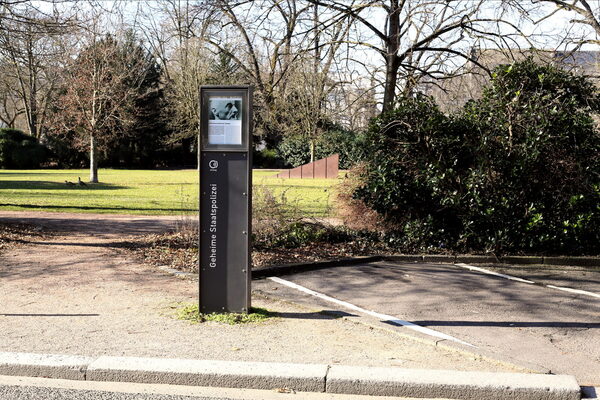Secret State Police
During the Nazi era, Paulinenstraße 9 was home to a field office of the Secret State Police in Frankfurt am Main.
During the Nazi era, Paulinenstraße 9 was home to a field office of the Secret State Police (Gestapo) in Frankfurt am Main. The Gestapo's interrogation methods were often similar to torture. The prisoners were sometimes inflicted with serious psychological and physical injuries. For example, testimony was extorted at gunpoint. Among others, the Gestapo harassed members of opposition youth groups here. Several Catholic and Protestant clergymen as well as foreign forced laborers were also interrogated and mistreated in the building at Paulinenstraße 9.
The Nazi regime was based not least on a comprehensive police surveillance and persecution apparatus. From the very beginning, opponents of the regime and Jews were targeted. Soon, other minorities were also subjected to racist persecution, such as so-called "community strangers". During the Nazi era, people could be arrested and sent to a concentration camp without a court ruling or the possibility of appeal. In 1936, the Reichsführer of the SS, Heinrich Himmler, who was already head of the Political Police and responsible for the concentration camps, was appointed head of the German police by Hitler. This meant that the criminal investigation department was also integrated into the Gestapo, which had existed since 1933. The police were now institutionally closely linked to the SS. In 1939, the security police, i.e. the Gestapo and the criminal investigation department, were merged with the SS security service in the so-called Reich Security Main Office. This was subordinate to the SS and was responsible for all police and security organs. The Gestapo played a key role in preparing and carrying out the deportations of Jews, Sintizze, Sinti, Romnija and Roma to concentration and extermination camps.
Dr. Hans Buttersack worked as a lawyer in Wiesbaden from 1909. A national conservative, he was a district leader of the "Stahlhelm" and spoke out in favor of the NSDAP in 1933. However, he rejected the integration of the "Stahlhelm" into the SA, whereupon he was arrested several times and put under pressure. The "Stahlhelm" was finally disbanded at the end of 1935. Dr. Buttersack was again targeted by the Gestapo in 1938. He was first imprisoned for insults and then for seven weeks for making statements critical of the regime, including in Friedrichstraße police prison. During this time, he was taken to Paulinenstraße for interrogation several times. He was arrested again on 6 May 1943. Dr. Hans Buttersack had been a courageous activist for the Confessing Church. He also supported Jews as legal counsel, although the Reich Citizenship Act of September 27, 1938 reserved this exclusively for so-called Jewish consulters. Jewish lawyers had been excluded from the legal profession in 1938. The Nazi regime allowed a few of them to continue their work as consultants. On May 28, 1943, Buttersack was sent to the Dachau concentration camp. He died there of typhus on February 13, 1945.
Foreign forced laborers were also monitored by the Gestapo. A specially established department was responsible for punishing the forced laborers. They could be sent to so-called labor education camps for even the smallest offenses. They could also be punished extremely harshly, in some cases with death, without trial. The Gestapo was also responsible for these trials and executions. A mobile gallows was even kept at the headquarters in Frankfurt for this purpose.
At the beginning of 1945, the building was destroyed by bombing and the office was then moved to Mainzer Straße 14.
Further information
City archive
Address
65197 Wiesbaden
Postal address
65029 Wiesbaden
Arrival
Notes on public transport
Public transportation: Bus stop Kleinfeldchen/Stadtarchiv, bus lines 4, 17, 23, 24 and 27 and bus stop Künstlerviertel/Stadtarchiv, bus line 18.
Telephone
- +49 611 313022
- +49 611 313977
Opening hours
Opening hours of the reading room:
- Monday: 9 a.m. to 12 p.m.
- Tuesday: 9 am to 4 pm
- Wednesday: 9 am to 6 pm
- Thursday: 12 to 16 o'clock
- Friday: closed
